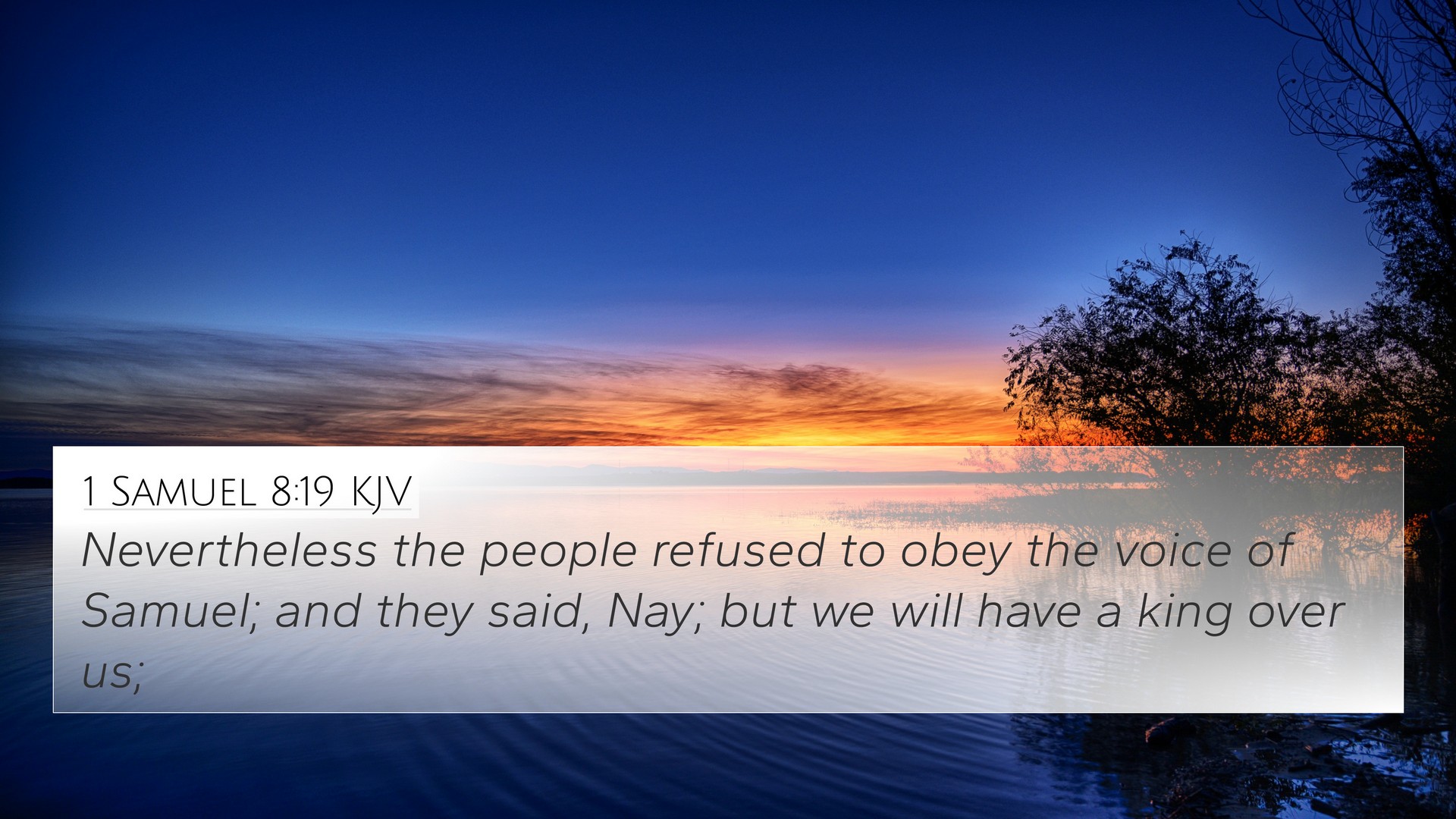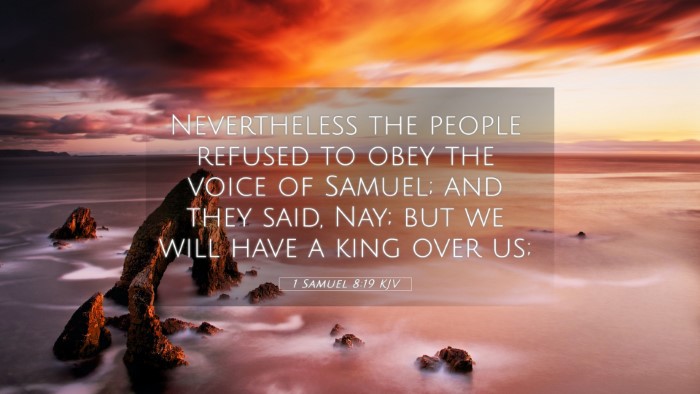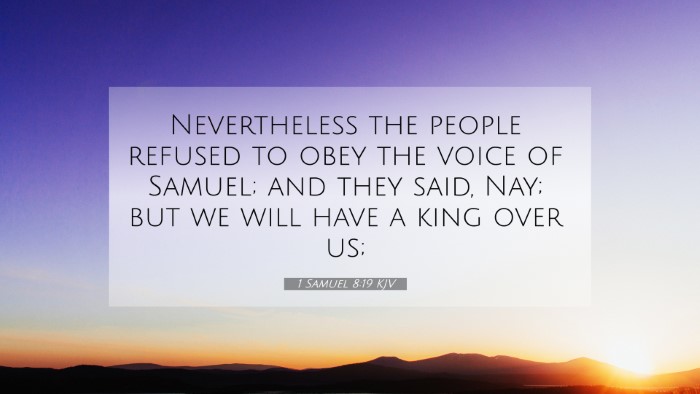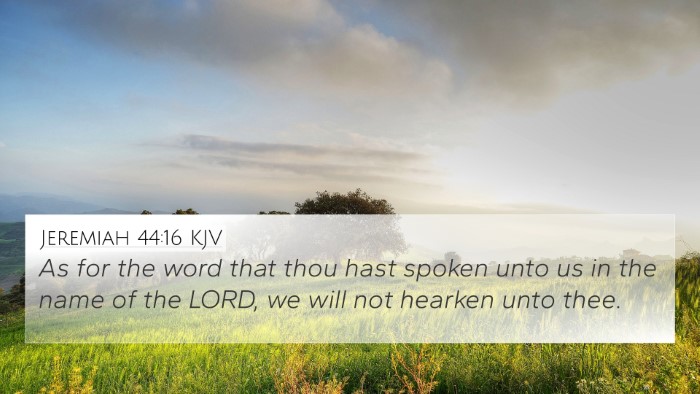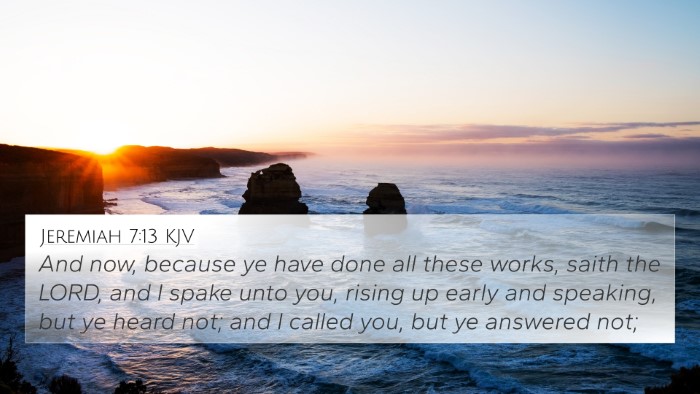Understanding 1 Samuel 8:19
Bible Verse: 1 Samuel 8:19
This verse states, "Nevertheless the people refused to obey the voice of Samuel; and they said, Nay; but we will have a king over us."
Summary of Major Themes
The plea of the Israelites for a king highlights several important themes in biblical interpretation: the rejection of divine authority, the desire for conformity to surrounding nations, and the implications of human leadership over God’s leadership.
Key Insights from Commentaries
- Matthew Henry: He emphasizes that the demand for a king represents a profound discontent with God's rule. The people choose to seek a human leader rather than trust in the divine guidance that had previously served them. This choice signifies a neglect of the spiritual over the worldly.
- Albert Barnes: Barnes draws attention to the concept of “obeying the voice of Samuel,” stressing that the people fully understand the ramifications of their request yet choose to ignore the warnings against kingship. Their insistence reflects a deeper desire for a tangible form of authority and governance.
- Adam Clarke: Clarke offers a nuanced view, suggesting that the Israelites were influenced by the success of other nations with kings. This desire to conform leads them away from their unique identity as God's chosen people, unraveling the covenantal relationship they had maintained for generations.
Cross-References for Deeper Understanding
To further explore the themes present in 1 Samuel 8:19, consider the following cross-references:
- Deuteronomy 17:14-15: This passage outlines the guidelines for appointing a king, illustrating foreknowledge of Israel's future desires.
- 1 Samuel 10:19: The context of the people's rejection of God as their king becomes more pronounced in this verse, showing their preference for earthly kings.
- 1 Kings 8:5: During the dedication of the temple, this verse echoes the Israelites’ history of asking for a king.
- Hosea 13:10: Here, God points out Israel's choice of earthly rulers over divine governance, underscoring their continuous cycle of rebellion.
- Hebrews 13:7: This verse speaks to the authority of leaders and the importance of faithfulness to spiritual guidance, contrasting the demand for a mortal king.
- Isaiah 33:22: It reminds believers that the Lord is our Judge, Lawgiver, and King, which challenges the intrinsic value of seeking human leadership.
- John 19:15: This reveals the ongoing struggle between divine authority and human leadership reflected in the New Testament.
- Acts 7:51-53: Stephen’s speech illustrates the rejection of God’s messengers, paralleling how the Israelites rejected Samuel despite his prophetic witness.
Thematic Connections in Scripture
The request for a king in 1 Samuel provides a backdrop for understanding the tension between divine sovereignty and human authority throughout the Bible.
Connections Between Verses
- John 18:36: Jesus emphasizes that His kingdom is not of this world, contrasting the Israelites' fleshly desire for an earthly king.
- Philippians 3:20: Believers are reminded that their citizenship is in heaven, which directly critiques the Israelites' call for an earthly ruler.
Practical Applications and Reflections
The implications of rejecting God's leadership in favor of human authority remain relevant today. Believers are encouraged to reflect on their own desires for control and ask themselves:
- Are there areas in my life where I seek human authority over divine guidance?
- How does the temptation to conform to societal norms impact my faith?
- Am I trusting God’s plan, or do I primarily rely on human wisdom?
Conclusion
1 Samuel 8:19 serves as a reminder of the eternal struggle between divine sovereignty and human inclination towards earthly authority. This verse encapsulates the desire for control that often clouds spiritual vision and highlights the need for ongoing reliance on God rather than the idols of human leadership.
